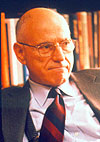100 Centre Street, the new series on A&E created by movie director Sidney Lumet (Monday, 9 p.m.), is not earth-shattering television, but it is based on a great premise: night court in Manhattan. Are you mad? you cry. In today's crime show-saturated environment, that is the most banal premise imaginable! True, but don't let its obviousness blind you to its dramatic potential. Urban criminal courts are studies in social contrast, one of the increasingly rare sites in a stratifying society where the acutely powerful and the chronically powerless meet face to face. After that, of course, the lawyers and judges ride their car-service limos uptown, the prisoners are hied off to Rikers Island, and the world goes merrily on. Still, all it would take is for one director to strip the patina of TV cliché off these dingy conference rooms and turn-of-the-century halls to give them the Dostoyevskian proportions that are their due.
Lumet merely manages Dreiserian proportions, but I'm not complaining. At least 100 Centre Street is not like Law & Order, an addictively watchable show that is also an instrument of victims' rights propaganda--some smart political consultant could easily cannibalize it for videos for a New York mayoral campaign. Instead of taking you inside a police or district attorney or defense lawyer's investigative process, as most crime shows do, 100 Centre Street takes you inside the lives of everyone in the criminal justice system--including the perps, usually more likely to serve as target practice than actual characters. The key to understanding Lumet's outmoded contextualism on the subject of crime is to know that he is 72 and a member of a generation of Jewish, left-wing New Yorkers that is quickly fading from the scene. Lumet is responsible for such bleeding-heart classics as Serpico, Dog Day Afternoon, and Running on Empty, whose heroes are, respectively, an honest cop who blows the whistle on a corrupt police force, a gay bank robber, and a family whose parents are '60s radicals who have gone underground. Each movie is suffused with a certain sense of, shall we say, alienation from the legal authorities.

Lumet has made his hero in 100 Centre Street a softhearted Jewish judge--elderly, of course. Judge Joseph Rifkind (Alan Arkin) is an ex-hippie known as "Let-'em-go Joe" who lets himself be moved by the hard-luck tales of petty offenders. (He is probably based on the New York State Supreme Court Judge Bruce "Turn-' em-loose" Wright.) Under the ironclad laws of post-Law & Order crime show logic, this requires Rifkind, in the pilot episode, to release a sullen black subway turnstile --jumper, who promptly goes out and kills a cop. But screw the tabloid-quality moral dilemma (which immediately becomes a major tabloid story and an issue, naturally, in a New York City mayoral campaign). The real reason to watch this show is Arkin, an actor of depth and presence who projects genuine moral seriousness without a hint of piety. Lumet's script reveals enough of Rifkind's thought process for us to grasp the calculation underneath the gentle manner, the old radical's skepticism about the legal system. But Arkin endows the man with pathos. He makes us understand the personal cost of the by now standard ritual of denouncing judges for political advantage.
The downside of Lumet's big-tent approach is that he gets carried away by the metaphoric possibilities of a New York City criminal court--you know, such a fabulous melting pot! Arkin is the only actor able to imbue the predictable ethnic tensions with grace. His eyebrows do the work when a foulmouthed political appointee who is yelling at Rifkind for releasing the kid tells him not to play "the self-righteous rabbi"--you see Arkin pondering the long, loving relationship between scapegoating and anti-Semitism, but he never says a word. (Click here to see a video clip of this scene.)


The rest of the show's subplots are infinitely less subtle. There's the implausible romance between the young, dark-haired, outer-borough-bred assistant district attorney of indeterminate ethnic origin (his name's Bobby Esposito, and we know that his grandfather was an immigrant, but we don't know from where and though he's a dead ringer for Al Pacino, his father has red hair and an almost Irish accent) and a blond scioness of Fifth Avenue WASPdom, also an ADA (her name is Cynthia Bennington, as in the college, and also as in a prominent white-shoe law firm of the show's invention). Their affair is unbelievable not because of the mixing of ethnicities and classes, though that is harped upon on every possible occasion, but because they flirt and argue and bare their souls and fondle each other's hands right in the middle of the district attorney's office, surrounded by about 20 colleagues, who never once look up. And why is it that the Latino Legal Aid attorney (Manny Perez) has to chase every "bit of prosecutorial tail" (as one character puts it) that comes his way? Or that the tough-minded, conservative black judge (LaTanya Richardson) had to have scraped her way up from a farm in Georgia, where she was, of course, raped as a girl? Still, if you, like me, have a nostalgic weakness for unreconstructed 1970s-style socially conscious drama, you'll forgive 100 Centre Street its lapses and tune in for this late-in-life plea for compassion from an old-fashioned liberal.
Stills from 100 Centre Street by Eric Liebowitz. All rights reserved.
